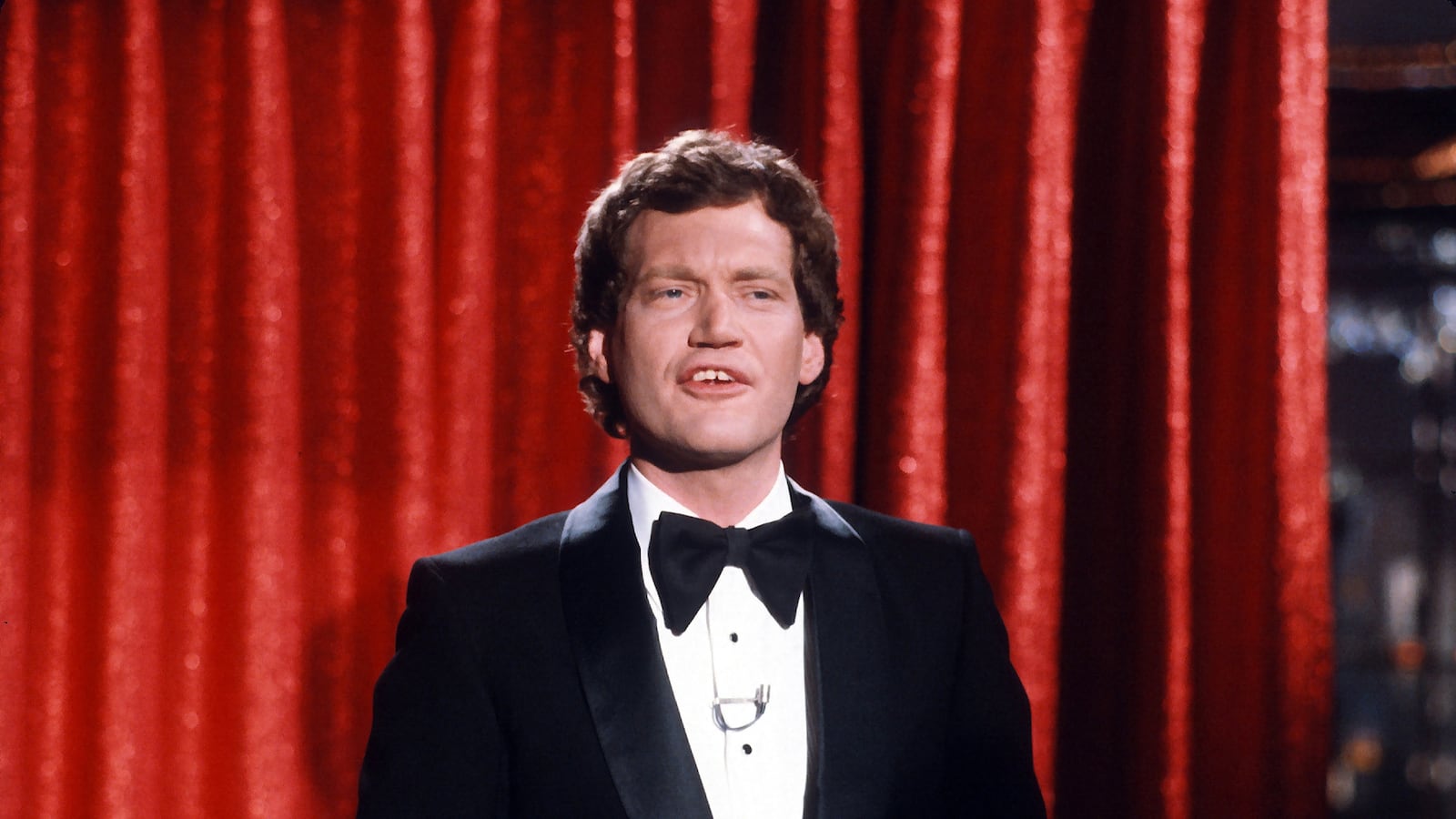For those of us who remember David Letterman as the young, skinny, smart-ass hayseed whose self-conscious, comedic sophistication made talk shows seem new again in the ’80s, Letterman’s retirement as the grand old man of the genre is hard to compute.
I didn’t much like him at first. In 1981, after his NBC morning show was canceled and he was hiring staff for his new late-night show, I was finishing up a stint as a segment producer for The Dick Cavett Show, which then aired nightly on PBS. Letterman and Cavett had the same manager, Jack Rollins, and my boss, Cavett’s executive producer, offered to recommend me for a job with Letterman. But I wasn’t interested.
While Letterman was on his way to remaking talk shows through parody and refined silliness, my man Cavett—following in the tradition of Jack Paar—had done the opposite. In his urbane, witty way, Cavett spoke with interesting people about interesting things. (See, among many other classics and near-classics, Cavett’s admiring conversations with the likes of Katharine Hepburn, Groucho Marx, and Janis Joplin, or the emotional confrontations between movie stars, journalists, and veterans over Vietnam and Watergate featured on Cavett’s recent PBS specials.)
Letterman—following the lead of the original Tonight Show host, the masterfully whacky Steve Allen—was interested in doing something different from Cavett. And to my 26-year-old self, Letterman seemed too much the perpetual adolescent getting away with foolish pranks while his parents were asleep. There was also something off-putting about Letterman’s celebration of the trivial with bits like “stupid pet tricks” or his Velcro suit. Besides, I didn’t like the way he destroyed things, dropping a keg of beer, a birthday cake, a wheel of brie and other foodstuffs off a five-story tower to watch them be rendered inedible in slow motion. Destroying food for fun struck me as tasteless, the product of a bored, affluent, and childish society.
Yet I recently found myself laughing pretty hard after I watched a YouTube clip of that keg of beer descend from on high. And while I’m not sure I was wrong to be uncomfortable with some of Letterman’s youthful gags, I was certainly wrong about Letterman.
For one thing, like everyone else working on talk shows, I had to tune in to Letterman’s show to see what he would try next. There was always something new, whether it was turning the local deli owner into an on-air personality, halting his monologues to engage in absurdly stilted brief sketches with his staff, or—my personal favorite—attaching a small camera to a monkey to create a “monkey cam.”
It soon became clear even to a skeptic like me that Letterman is the Picasso of post-modern late-night comedy, the reigning genius. All the others are Georges Braque at best, or maybe Juan Gris. As Jon Stewart and lesser mortals are quick to acknowledge, every talk show host who’s come along since Letterman is working in his shadow.
From the beginning, Letterman’s central conceit appeared to be that much of television was bullshit. There was a bit of Holden Caufield’s war against “phonies” in Letterman’s unspoken stance. But while Letterman found his comedic voice early, over the years he managed to preserve the integrity of that voice as it darkened into something deeper and more deeply entertaining.
Early on, Letterman was determined to undermine the pretense that a conversation on TV was a fun back-and-forth between famous friends rather than a planned, produced piece of fluff designed to get laughs and promote something: a new movie, record, or TV show.
Years later, when Letterman was feuding with Oprah Winfrey, he referred to her magazine, O, by saying (if memory serves), “You know, the one that always has a picture of Oprah on the front pretending to have a good time.” This was precisely what Letterman seemed determined to never do: pretend to have a good time. Instead, he continued to be himself, which is hard enough to do when you’re not on TV every night, let alone starring in a largely unscripted, hour-long, live-to-tape show.
While it’s true that talk shows don’t follow a script, they do follow a format. Format is the grammar of studio-based television, an outline that answers the question: What happens next? It’s one of the triumphs of The Late Show that its format perfectly displays Letterman’s comedic gifts and the shifts in his often cranky mood. When Letterman does something during the show—it seems to be because he wants to do it. That’s key to his integrity as a performer. And the cozy familiarity of The Late Show format allows Letterman to feel at home and at ease, to appear to be spontaneous while presenting a performed version of his real self.
Of course, Letterman’s bandleader, Paul Shaffer, is a huge part of the success of the show. The band’s expertly timed musical riffs fill the silence if Letterman’s jokes fall flat. In 1995, when Letterman floundered as host for the Oscars, it was partly because Shaffer wasn’t there for Letterman to play off of. When a bit bombed—remember Tom Hanks and the spinning dog?—there was no Paul Shaffer to make it feel funny anyway.
Though Shaffer is as self-aware as Letterman, his conceit as a performer seems to be the opposite of his TV friend Dave. Shaffer is always upbeat, always laughing in a very old-fashioned show business way—even as he’s winking at the viewer to acknowledge it’s just an act. Over time, though, it seemed that maybe Shaffer wasn’t merely pretending to have fun. Maybe he was actually having fun. And why not? He’s had a great gig for more than three decades.
And just as Shaffer has grown more complex as a presence on the air, Letterman himself has also grown in even more interesting ways. Age does that to you, of course. So does a quintuple bypass and a sex scandal.
Letterman’s reaction to the brush with mortality brought on by his heart operation in 2000 was predictable enough: He softened a bit and exhibited a newfound appreciation for life’s fragility. He famously brought everyone from Columbia Presbyterian Hospital who’d taken care of him onto his stage to thank them. It may have been the first time he showed genuine emotion on TV, so deep is his distrust of mawkish show biz displays.
He again showed remarkable grace during the opening minutes of his first show following 9/11. “It’s terribly sad here in New York City,” Letterman said. “You can feel it. You can see it.” He added, “I don’t trust my judgment in matters like this.” After paying tribute to Mayor Giuliani, Letterman went on to say, “There is only one requirement of any of us, and that is to be courageous.” Maybe Letterman didn’t trust his judgment on that night, but many viewers likely did.
This odd, self-conscious, very private—and remarkably funny—man again proved to be movingly honest when the news broke of a failed plot to blackmail him by revealing his affair with a young staffer.
Letterman’s handling of the career-threatening scandal should be taken as a model for any politician or public figure caught doing something they shouldn’t be doing. He simply went on the air and—speaking in his own idiosyncratic voice, free of equivocating, image-consultant-generated jargon—told the public exactly what had happened. “I didn’t know what else to do,” Letterman explained in his recent exit interview with The New York Times, “I couldn’t think of a really good lie.”
Here Letterman’s characteristic Midwestern self-deprecating humor seems less like false modesty and more like a genuine reflex born out of his lifelong distrust of self-aggrandizing bullshit. I’m not sure I can say as much about all of Letterman’s boyish successors who fawn over their celebrity guests and patronize the audience in ways that I had imagined Letterman long ago banished from TV.
Even during Letterman’s recent bittersweet farewell chats with his favorite famous guests, he has not struck a false note. Before Sarah Jessica Parker began to effuse about Letterman, she warned him to “take it like a man.” She then called him “probably the most distinguished man on late night.” Shaffer’s band punctuated the moment with a mock epic flourish. But Letterman managed to take the praise like a man. “It means a lot to me coming from you,” he said. “Others have said rather clumsily the same thing, and it doesn’t mean anything coming from them. But coming from you, it does mean something.”
In that exchange, and the other genuinely felt moments that have followed with everyone from President Obama on down, Letterman achieved something he might have thought was impossible in television: unvarnished sincere emotion. This is possible for Letterman because his war on insincerity has been so relentless—and so successful.
By now, Letterman has proven himself to be incapable of the thing he seemed to fear most: TV bullshit. And over the years, this master of irony has achieved, of all things, a certain, hard-won gravitas.






